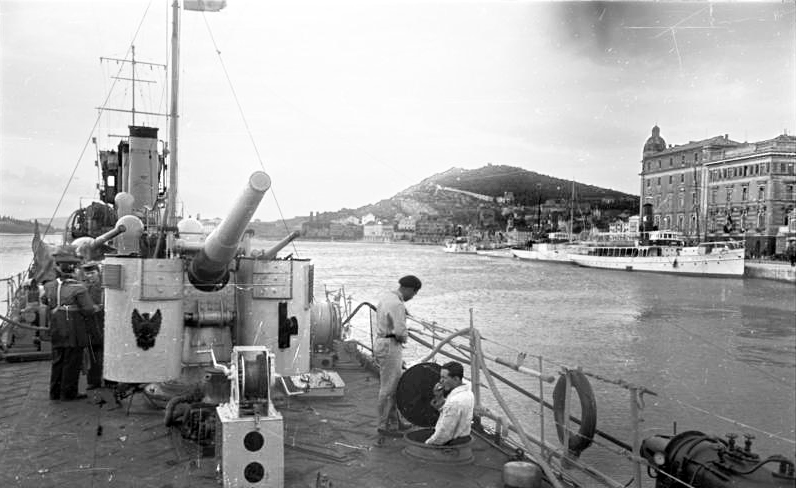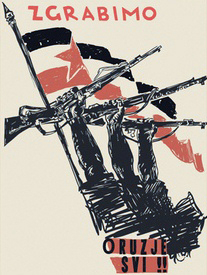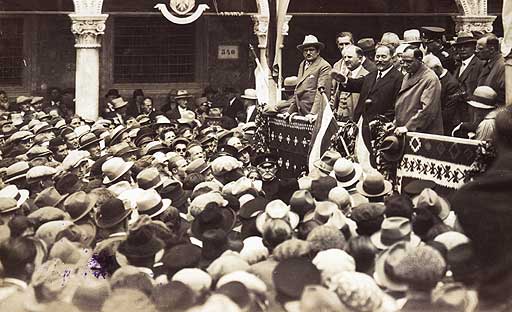|
1st Split Partisan Detachment
The 1st Split Partisan Detachment ( sh, Prvi splitski partizanski odred) or the 1st Split Detachment ( sh, Prvi splitski odred, links=no) was a short-lived unit of the Yugoslav Partisans during World War II. It was composed of volunteers from the city of Split and was created in August 1941, just four months after the Axis occupation of Yugoslavia, and the annexation of Split and most of Dalmatia by the Kingdom of Italy. The unit, composed mostly of young men with little or no fighting experience, planned to relocate to the Dinara mountains to join other Partisan units in fighting the Axis powers. After initial organizational problems, the weakened detachment reached an area near the village of Košute where they were engaged by Ustaše Militia backed by Italian reinforcements. After a day of fighting and the death of one of their commanders, members of the detachment began to retreat. In the end, the Partisans suffered four killed in action and 25 taken prisoner, while 13 manag ... [...More Info...] [...Related Items...] OR: [Wikipedia] [Google] [Baidu] |
Yugoslav Partisans
The Yugoslav Partisans,Serbo-Croatian, Macedonian, Slovene: , or the National Liberation Army, sh-Latn-Cyrl, Narodnooslobodilačka vojska (NOV), Народноослободилачка војска (НОВ); mk, Народноослободителна војска (НОВ); sl, Narodnoosvobodilna vojska (NOV) officially the National Liberation Army and Partisan Detachments of Yugoslavia, sh-Latn-Cyrl, Narodnooslobodilačka vojska i partizanski odredi Jugoslavije (NOV i POJ), Народноослободилачка војска и партизански одреди Југославије (НОВ и ПОЈ); mk, Народноослободителна војска и партизански одреди на Југославија (НОВ и ПОЈ); sl, Narodnoosvobodilna vojska in partizanski odredi Jugoslavije (NOV in POJ) was the communist-led anti-fascist resistance to the Axis powers (chiefly Germany) in occupied Yugoslavia during World War II. Led by Josip Broz T ... [...More Info...] [...Related Items...] OR: [Wikipedia] [Google] [Baidu] |
Puppet State
A puppet state, puppet régime, puppet government or dummy government, is a State (polity), state that is ''de jure'' independent but ''de facto'' completely dependent upon an outside Power (international relations), power and subject to its orders.Compare: Puppet states have nominal Sovereign state, sovereignty, but a foreign power effectively exercises control through means such as financial interests, economic, or military support. By leaving a local government in existence the outside Powers evade all responsibility, while at the same time successfully paralyzing the Government they tolerate. Puppet states are distinguished from Alliance, allies, which choose their actions on their own or in accordance with Treaty, treaties they voluntarily entered. Puppet states are forced into Rubber stamp (politics), providing legal endorsement for actions already taken by a foreign power. Characteristics A puppet state preserves the external paraphernalia of independence (such as a ... [...More Info...] [...Related Items...] OR: [Wikipedia] [Google] [Baidu] |
Livanjsko Field
Livanjsko polje (), located in Bosnia and Herzegovina, is the largest ''polje'' (karstic field) in the world. A typical example of karst polje encircled by tall peaks and mountain ranges, the field is characterized by many unique natural phenomenons and karstic features. Geography The field has an area of 45,868 hectare, 458.7 km², and an average width of 6 km. It is located at an average height of 720 m above sea level. The field is located in region of Tropolje, in the southwest of Bosnia and Herzegovina, and lies between the karstic mountains of Dinara and Kamešnica on the south, Tušnica mountain on the east, Cincar and Golija mountain on the north and Šator and Staretina mountain on the west. Buško Blato ''( Buško lake)'' lies to the southeast, and Ždralovac to the northwest. Ždralovac is a narrow corridor by which the Livno field is connected to the Grahovsko field, between the slopes of mountains Dinara, Kamešnica and Šator. Climate In ... [...More Info...] [...Related Items...] OR: [Wikipedia] [Google] [Baidu] |
Sinj
Sinj (; it, Signo; german: Zein) is a town in the continental part of Split-Dalmatia County, Croatia. The town itself has a population of 11,478 and the population of the administrative municipality, which includes surrounding villages, is 24,826 (2011). Geography Sinj is located in the heart of the Dalmatian hinterland, the area known as ''Cetinska krajina'', a group of settlements situated on a fertile karstic field of Sinjsko polje through which the river Cetina passes. Sinj lies between four mountains: Svilaja, Dinara, Kamešnica and Visoka. Those mountains give Sinj its specific submediterranean climate (hotter summers and colder winters). History Sinj was seized by the Turks in 1524 who maintained control until 1686, when it was taken into possession by the Venetians. The town grew around an ancient fortress held by the Ottomans from 16th until the end of 17th century, and the Franciscan monastery with the church of Our Lady of Sinj (), a place of pilgrimage. The l ... [...More Info...] [...Related Items...] OR: [Wikipedia] [Google] [Baidu] |
Yugoslav Partisan
The Yugoslav Partisans,Serbo-Croatian, Macedonian, Slovene: , or the National Liberation Army, sh-Latn-Cyrl, Narodnooslobodilačka vojska (NOV), Народноослободилачка војска (НОВ); mk, Народноослободителна војска (НОВ); sl, Narodnoosvobodilna vojska (NOV) officially the National Liberation Army and Partisan Detachments of Yugoslavia, sh-Latn-Cyrl, Narodnooslobodilačka vojska i partizanski odredi Jugoslavije (NOV i POJ), Народноослободилачка војска и партизански одреди Југославије (НОВ и ПОЈ); mk, Народноослободителна војска и партизански одреди на Југославија (НОВ и ПОЈ); sl, Narodnoosvobodilna vojska in partizanski odredi Jugoslavije (NOV in POJ) was the communist-led anti-fascist resistance to the Axis powers (chiefly Germany) in occupied Yugoslavia during World War II. Led by Josip Broz Tit ... [...More Info...] [...Related Items...] OR: [Wikipedia] [Google] [Baidu] |
Communist Party Of Croatia
League of Communists of Croatia ( sh, Savez komunista Hrvatske or SKH) was the Croatian branch of the League of Communists of Yugoslavia (SKJ). It came into power in 1945. Until 1952, it was known as Communist Party of Croatia (''Komunistička partija Hrvatske,'' KPH). In the early 1990s, it underwent several renames and lost power. History Kingdom of Yugoslavia The party was formally founded in 1937 with Pavle Gregorić as its first general secretary. The reasons for KPJ to have its specifically Croatian branch were partly ideological, partly practical. Croatia, just as Slovenia, which would have its Communist Party at the same time, was the most industrialised part of the country, with the biggest percentage of working class in the population, and, therefore, more likely to adopt communism than rural Serbia. The other, more practical, reason was in the increased marginalisation of Communists in Croatian political life due to public more preoccupied with ethnic issues an ... [...More Info...] [...Related Items...] OR: [Wikipedia] [Google] [Baidu] |
League Of Communist Youth Of Yugoslavia
, SKOJ mk, Сојуз на комунистичката младина на Југославија, СКМЈ sl, Zveza komunistične mladine Jugoslavije, ZKMJ , colorcode = red , founded = 1919 , dissolved = 1948 , succeeded by = League of Socialist Youth of Yugoslavia , ideology = CommunismMarxism–Leninism , headquarters = Belgrade , mother party = Communist Party of Yugoslavia , international = World Federation of Democratic Youth League of Communist Youth of Yugoslavia, commonly known in English as the Young Communist League of Yugoslavia, or simply Communist Youth, was the youth wing of the Communist Party of Yugoslavia from 1919 to 1948. Although it was banned just two years after its establishment and at times ruthlessly prosecuted, it continued to work clandestinely and was an influential organization among revolutionary youth in the Kingdom of Yugoslavia, and consequently became a major organizer of Partisan resistance to Axis occupation and local Quisling f ... [...More Info...] [...Related Items...] OR: [Wikipedia] [Google] [Baidu] |
Gendarmerie
Wrong info! --> A gendarmerie () is a military force with law enforcement duties among the civilian population. The term ''gendarme'' () is derived from the medieval French expression ', which translates to " men-at-arms" (literally, "armed people"). In France and some Francophone nations, the gendarmerie is a branch of the armed forces that is responsible for internal security in parts of the territory (primarily in rural areas and small towns in the case of France), with additional duties as military police for the armed forces. It was introduced to several other Western European countries during the Napoleonic conquests. In the mid-twentieth century, a number of former French mandates and colonial possessions (such as Lebanon, Syria, the Ivory Coast and the Republic of the Congo) adopted a gendarmerie after independence. A similar concept exists in Eastern Europe in the form of Internal Troops, which are present in many countries of the former Soviet Union and its ... [...More Info...] [...Related Items...] OR: [Wikipedia] [Google] [Baidu] |
Croatian Peasant Party
The Croatian Peasant Party ( hr, Hrvatska seljačka stranka, HSS) is an agrarian political party in Croatia founded on 22 December 1904 by Antun and Stjepan Radić as Croatian Peoples' Peasant Party (HPSS). The Brothers Radić believed that the realization of Croatian statehood was possible within Austria-Hungary, but that it had to be reformed as a Monarchy divided into three equal parts – Austria, Hungary, Croatia. After the creation of Kingdom of Yugoslavia in 1918, Party requested for the Croatian part of the Kingdom to be based on self-determination. This brought them great public support which culminated in 1920 parliamentary election when HPSS won all 58 seats assigned to Croatia. In 1920, disgruntled with a bad position of Croats in the Kingdom, the party changed its name into Croatian Republican Peasant Party (HRSS) and started advocating secession from the Kingdom and the establishment of ''"peaceful peasant Republic of Croatia"''. On 1923 and 1925 election, HRS ... [...More Info...] [...Related Items...] OR: [Wikipedia] [Google] [Baidu] |
Ustaše
The Ustaše (), also known by anglicised versions Ustasha or Ustashe, was a Croats, Croatian Fascism, fascist and ultranationalism, ultranationalist organization active, as one organization, between 1929 and 1945, formally known as the Ustaša – Croatian Revolutionary Movement ( hr, Ustaša – Hrvatski revolucionarni pokret). Its members murdered hundreds of thousands of Serbs of Croatia, Serbs, Jews of Croatia, Jews, and Romani people in Croatia, Roma as well as political dissidents in World War II in Yugoslavia, Yugoslavia during World War II. The ideology of the movement was a blend of fascism, Roman Catholicism and Croatian nationalism, Croatian ultranationalism. The Ustaše supported the creation of a Greater Croatia that would span the Drina River and extend to the border of Belgrade. The movement emphasized the need for a Racial purity, racially "pure" Croatia and promoted Genocide of Serbs in the Independent State of Croatia, genocide against Serbs—due to the Usta ... [...More Info...] [...Related Items...] OR: [Wikipedia] [Google] [Baidu] |
Treaties Of Rome (1941)
The 1941 Treaties of Rome were a series of treaties concluded by the Fascist Italian regime and the World War II collaborationist Independent State of Croatia (''Nezavisna Država Hrvatska'', NDH) on 18 May 1941, following the Axis Invasion of Yugoslavia. The treaties determined the borders between the NDH and Italy, effectively ceding territory largely organised as the Governorate of Dalmatia to the latter. They also prohibited the NDH from deploying naval forces to the Adriatic Sea, and restricted movement of its troops in the Italian-controlled part of the NDH. Other provisions of the treaties largely subordinated the NDH to Italian interests in matters of defence, foreign policy and economy, and effectively placed the NDH in the position of a quasi-protectorate, obliging the NDH to conclude further treaties required by Italy. Finally, the treaties established that the NDH's Ustaše regime, led by Ante Pavelić, would offer the position of the King of Croatia to a member of ... [...More Info...] [...Related Items...] OR: [Wikipedia] [Google] [Baidu] |
Serbia
Serbia (, ; Serbian language, Serbian: , , ), officially the Republic of Serbia (Serbian language, Serbian: , , ), is a landlocked country in Southeast Europe, Southeastern and Central Europe, situated at the crossroads of the Pannonian Basin and the Balkans. It shares land borders with Hungary to the north, Romania to the northeast, Bulgaria to the southeast, North Macedonia to the south, Croatia and Bosnia and Herzegovina to the west, and Montenegro to the southwest, and claims a border with Albania through the Political status of Kosovo, disputed territory of Kosovo. Serbia without Kosovo has about 6.7 million inhabitants, about 8.4 million if Kosvo is included. Its capital Belgrade is also the List of cities in Serbia, largest city. Continuously inhabited since the Paleolithic Age, the territory of modern-day Serbia faced Slavs#Migrations, Slavic migrations in the 6th century, establishing several regional Principality of Serbia (early medieval), states in the early Mid ... [...More Info...] [...Related Items...] OR: [Wikipedia] [Google] [Baidu] |








